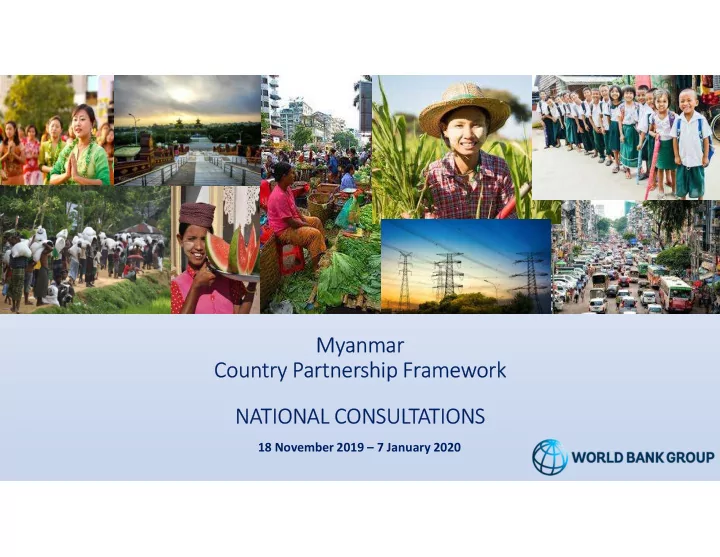

Myanmar Country Partnership Framework NATIONAL CONSULTATIONS 18 November 2019 – 7 January 2020
World Bank Group (WBG) Country Engagement Process Country Systematic Performance Completion Partnership Country and Learning and Learning Framework Diagnostic Review Review (SCD) (PLR) (CLR) (CPF) 1. The SCD identifies the challenges and opportunities for eliminating poverty and boosting shared prosperity in Myanmar; it includes a political and social context, recent economical developments, poverty profile, and main development challenges. It is linked to the national development strategy. 2. The CPF is a multi-year development plan built on the SCD, outlining the WBG’s program of interventions in Myanmar for the next 4 years; it is prepared using a consultative process. 3. The PLR reviews implementation of the CPF plans, to assess whether the WBG is on track and to make adjustments to the framework to ensure it supports the achievement of substantive outcomes; It compliments annual monitoring and reviews 4. The CLR evaluates if the goals set in the CPF are achieved and identifies lessons for future WBG engagement in Myanmar
The proposed Country Partnership Framework: Addresses lessons learned from the current (2015 – 2019) Framework Links with Myanmar’s Sustainable Development Plan 2018-2030 Aligns with the UN Sustainable Development Goals 2015-2030 Seeks nationwide inputs from all stakeholders in Myanmar Will be submitted to the WBG Board in early 2020
Main lessons learned between 2015-2019: Ensure a systemic and measurable approach to promoting inclusion and peace Strengthen support for improving governance and institutional capacity Focus on more targeted interventions, adequate resources and time to accompany and support the government in implementation Combine public and private approaches to responding to Myanmar's development challenges
The proposed CPF identifies 3 focus areas: Focus Area 2: Focus Area 3: Focus Area 1: Fostering Enhancing climate and Building human responsible private disaster resilience and capital and fostering sector-led growth sustainable natural peaceful and inclusive resource and communities economic environmental opportunities management Cross-cutting Theme : Promoting social inclusion, including in conflict-affected areas
Guiding principles to maximize impact: • Focus on areas where WBG is already investing or engaged in policy dialogue • Geographically-targeted investments and support to strengthen institutions to generate bottom-up momentum for national reform • Targeting support to people in underserved and conflict-affected areas • Reinforcing inclusive engagement with non-state actors
Focus Area 1: Building human capital and fostering peaceful communities Objectives: • Strengthen the capacity of public institutions to make policies, plan and deliver services more effectively, transparently and equitably • Improve inclusive access to community- level services and infrastructure • Improve inclusive access to, and quality of, basic social services
Examples of activities under Focus Area 1 include: • Access to essential health services and maternal and child cash transfers • Access to quality education for all • Community-identified investments, such as schools, electrification and rural infrastructure, to support peace and inclusive development
Focus Area 2: Fostering responsible private-sector-led growth and inclusive economic opportunities Objectives: • Strengthen institutional capabilities for macroeconomic and financial sector management • Improve the business environment, foster responsible private-sector-led growth, and facilitate international trade • Narrow the infrastructure and technology gap • Improve income generation and productivity in selected sectors and zones
Examples of activities under Focus Area 2 include: • Creating a stable and competitive environment for businesses • Strengthen institutional capacity and improve access to finance • Increasing energy access and reliability of power supply • Help farmers and agri- business to produce better and earn more • Connecting Myanmar nationwide and to the world
Focus Area 3: Enhancing climate and disaster resilience and sustainable natural resource and environmental management Objectives: • Improve the sustainable management of natural resources by targeting waterways, fisheries, forests, waste and plastics management • Strengthen the resilience of vulnerable communities against climate and natural disaster risks
Examples of activities under Focus Area 3 include: • Integrated management of the Ayeyarwady river • Insurance to finance recovery from natural disasters • Supporting solid waste and pollution management
Cross-cutting: Promoting Social Inclusion, including in conflict areas • Application of Inclusion and Peace Lens* to all investments to ensure conflict sensitivity and inclusion • Identification and closing of gender gaps • Increased investments in conflict-affected and most- underserved people and areas *The Inclusion and Peace Lens (IPL) guides project teams in determining whether investments adequately address and cover conflict sensitivity and inclusion (including gender)
What are the risks to achieving the CPF objectives? • A slow-down in reform momentum • Weak institutional capacity to implement reforms and investments • Challenges to meet international standards on environmental and social risk management • Differing positions from stakeholders In a deeply contested environment • An upsurge in violent conflict
Proposed measures to mitigate risks: • Strengthen institutional capacity (fiduciary; social; environmental) • Engage widely and inclusively with state and non-state actors • Empower local communities and subnational institutions to drive development • Apply consolidated data monitoring tools to the program and project
Guiding questions for discussions at consultations: • Do you think the proposed CPF focus areas and objectives are the right ones for the WBG to focus on in Myanmar? • Which other areas of engagement should be considered? • What challenges need to be addressed to be successful in the focus areas of the CPF? • How do we best bring the cross-cutting theme – promoting social inclusion, including in conflict areas – into practice? • How can we support the government in implementing its own development program?
Recommend
More recommend